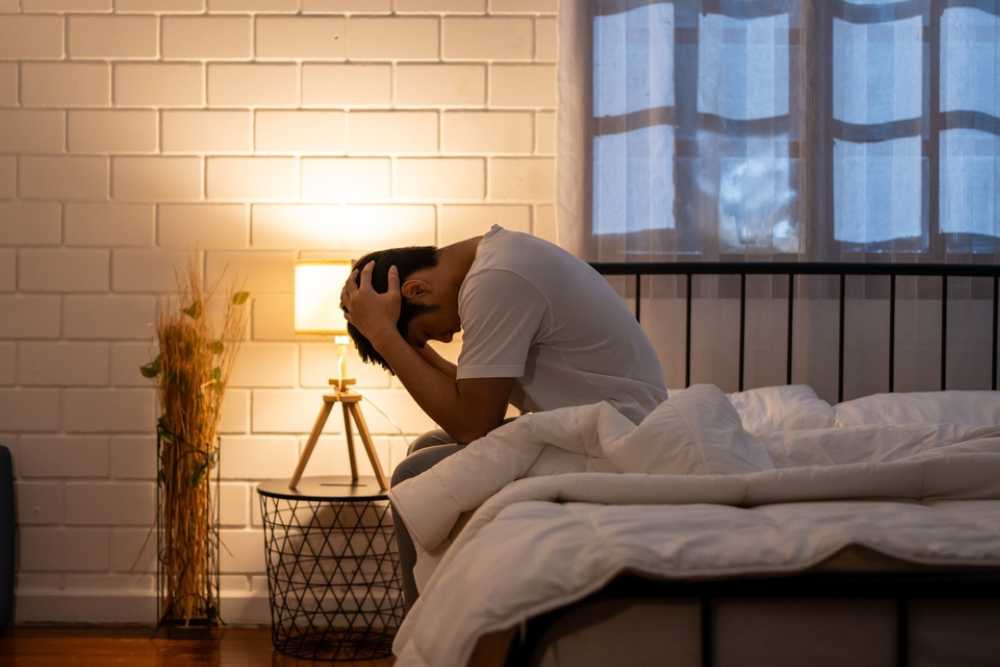Waking up with racing heartbeat can be a distressing experience, often leaving individuals unsure of the cause. While there are several potential explanations, anxiety—especially nighttime anxiety or panic attacks—is a common contributor. During sleep, the body may still respond to stressors or unresolved emotional tension, causing symptoms like a racing heartbeat, sweating, or shortness of breath upon waking. For many, this experience can be a sign that anxiety is manifesting during rest, even if they don’t feel anxious before bed.

How Can You Tell if Your Nighttime Symptoms Are Anxiety-Related?
Anxiety-related symptoms that occur during the night or early morning can often feel confusing or even alarming. Many people assume something is physically wrong, especially if the symptoms come on suddenly and interrupt sleep. However, anxiety can quietly build throughout the day and manifest once the body is in a more relaxed, unguarded state, like during sleep.
Here are some of the most common signs that your nighttime symptoms are related to anxiety:
- Sudden waking up with racing heartbeat, often accompanied by a feeling of fear or restlessness
- Hyper-awareness of bodily sensations, such as muscle tension or shallow breathing
- Recurring thoughts or mental loops, which make it difficult to fall back asleep
- Physical signs of panic, like trembling, nausea, or sweating, without an apparent medical cause
- Increased sensitivity to normal noises or sensations, such as ambient light, temperature changes, or small movements
For many people, nighttime anxiety stems from unresolved stress, trauma, or daily worries that haven’t been fully processed. The mind may go quiet at night, but the nervous system can remain on high alert. Tracking patterns—such as what time you wake up, whether symptoms follow stressful days, and how long it takes to fall back asleep—can help determine whether the underlying issue is anxiety-related.
Some people may benefit from tools like meditation or progressive muscle relaxation before bed. Others may need more structured support, such as anxiety treatment for the military in Southern California or therapy targeting trauma responses. Understanding the link between nighttime symptoms and anxiety is the first step toward managing and reducing their frequency.
Can Panic Attacks Occur During Sleep?
Panic attacks don’t just happen during the day; they can occur during sleep and are referred to as nocturnal panic attacks. These episodes often strike without warning, waking individuals from a deep sleep with intense physical and emotional symptoms. Even without a conscious trigger, the body’s stress response system can activate, leading to sudden distress that mirrors daytime panic attacks.
Symptoms of nocturnal panic attacks include:
- Waking up with a racing heartbeat or a pounding chest
- Intense fear or dread, often with no identifiable cause
- Chest pain, shortness of breath, or choking sensations, which can feel similar to heart issues
- Shaking, dizziness, nausea, or a sense of being detached from reality
- Difficulty calming down, even after the episode ends
What makes nocturnal panic attacks particularly unsettling is that they bypass our usual mental defenses—we’re not awake and aware when they start. This can leave individuals feeling powerless or out of control, especially if the episodes occur frequently. Many people report being afraid to go to sleep for fear of another attack.
These types of panic attacks are often associated with underlying anxiety disorders, unresolved trauma, or chronic stress. In some cases, sleep apnea or other sleep disorders can mimic similar symptoms, so it’s important to rule out medical causes as well.
Addressing this issue typically involves both short-term and long-term strategies. Short-term interventions may include breathing exercises, grounding techniques, and changes to sleep routines. Long-term solutions may involve trauma-specific care like trauma-informed therapy or structured anxiety management plans. The good news is that with the proper support, nocturnal panic attacks can become manageable and even disappear entirely over time.
Mental Health Treatment That Works
Call 949-625-0564What our customers are saying
How Do You Know If It’s Anxiety or a Heart Issue?
When waking up with racing heartbeat symptoms, it’s only natural to question whether something more serious is going on. After all, a rapid heart rate is also associated with heart-related conditions like arrhythmias, atrial fibrillation, or even early signs of a heart attack. Because the symptoms of anxiety and heart conditions often overlap, determining the root cause can be tricky without medical evaluation.
Here’s how to begin distinguishing between the two:
Signs your symptoms are more likely anxiety-related:
- The episodes occur primarily during periods of stress or emotional upheaval
- Symptoms subside relatively quickly when you practice deep breathing or relaxation techniques
- You’ve experienced similar symptoms in the past without any heart diagnosis
- You notice other signs of anxiety, such as irritability, restlessness, or difficulty concentrating
- The episodes follow known anxiety triggers (e.g., conflict, pressure at work, trauma reminders)
Signs your symptoms may be heart-related:
- You have a family history of heart disease or personal risk factors like high blood pressure or high cholesterol
- The rapid heart rate persists even when you’re calm or at rest
- You experience dizziness, fainting, or chest pain during activity
- Physical exertion consistently triggers symptoms
- Your heartbeat feels erratic, irregular, or skips beats
One important note: even if you suspect anxiety is the cause, it’s critical to rule out physical conditions first. This often involves a visit to your primary care provider or cardiologist, who may run blood tests, ECGs, or Holter monitor evaluations. If your test results are typical but you’re still waking up with a racing heart, it’s time to explore emotional and psychological causes. Anxiety frequently manifests through the body, and professional anxiety care can help prevent misdiagnosis while guiding you toward recovery.
Are There Therapies That Address Nighttime Anxiety or Panic?
Fortunately, there are a variety of therapeutic approaches that effectively target anxiety-related symptoms that occur during sleep, such as waking up with racing heartbeat. These treatments can help reduce the frequency and intensity of nighttime panic, improve sleep quality, and restore peace of mind. Here are several evidence-based therapies for managing nighttime anxiety and panic attacks:
- Cognitive Behavioral Therapy (CBT): One of the most widely recommended treatments, CBT helps individuals identify and reshape negative thinking patterns. Specialized versions like CBT-I (CBT for Insomnia) directly address the sleep-anxiety cycle.
- Mindfulness and Meditation: These practices calm the nervous system, reduce cortisol levels, and improve emotional regulation. When done consistently before bedtime, they can reduce both anxiety and the likelihood of panic episodes.
- Trauma-Informed Therapy: For individuals whose nighttime symptoms stem from unresolved trauma, a trauma-informed approach helps address the root emotional pain in a safe, supportive setting.
- EMDR (Eye Movement Desensitization and Reprocessing): EMDR has been particularly effective for trauma-related anxiety and nightmares. By reprocessing past trauma, the brain learns to react less intensely to triggers.
- Medication Management: In some cases, SSRIs, beta blockers, or sleep aids may be prescribed to regulate symptoms. These are typically used in conjunction with therapy for better long-term results.
- Lifestyle Interventions: Reducing screen time, avoiding stimulants, establishing a relaxing bedtime routine, and engaging in regular physical activity can all improve anxiety and sleep.
Those with military backgrounds or PTSD may benefit from specialized programs like anxiety support for service members, which offer targeted care for trauma-exposed populations. Working with a licensed provider ensures treatment is tailored to the individual’s specific triggers and experiences. Whether you choose a structured therapeutic program, mindfulness-based practices, or a combination of both, consistent treatment can lead to significant improvements in nighttime anxiety and overall sleep health.

Key Takeaways on Waking Up With Racing Heartbeat
- Waking up with a rapid heart rate can be a symptom of anxiety, especially if paired with other stress-related signs.
- Nocturnal panic attacks can cause sudden, intense waking episodes with physical and emotional distress.
- It’s important to rule out heart issues before assuming anxiety is the cause, especially if symptoms are new or worsening.
- Therapies like CBT, mindfulness, and trauma-informed care can significantly reduce nighttime anxiety symptoms.
- Tracking symptoms and getting professional support are key steps toward managing anxiety-related sleep disturbances.
If waking up with racing heartbeat is impacting your sleep, health, or quality of life, it’s time to get help. At Moment of Clarity, we offer compassionate, personalized care for those struggling with anxiety and related symptoms. Our team specializes in evidence-based treatment methods that address both physical and emotional health. Whether you’re experiencing panic attacks at night or chronic anxiety throughout the day, we’re here to guide you toward lasting relief. Call us today at 949-625-0564 to speak with a member of our care team or schedule a consultation.
Resources
- Cleveland Clinic – Nocturnal Panic Attacks
- Sleep Foundation – Anxiety at Night
- Harvard Health – Anxiety and Physical Symptoms




